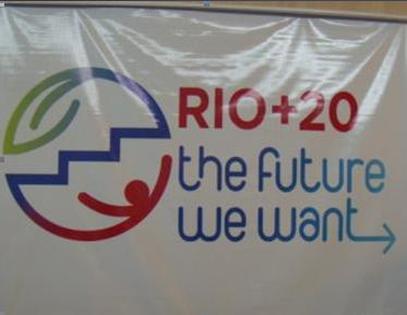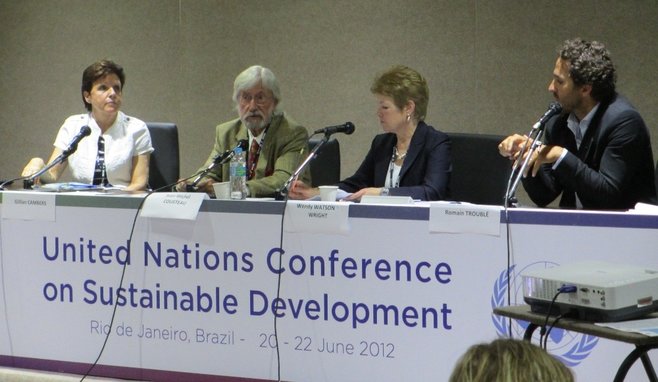
Sandwatch featured at “Rio+20 the future we want” event, June 20-22, 2012
At the Rio+20 Conference, world leaders, along with thousands of participants from governments, the private sector, NGOs and other groups, came together to shape how we can reduce poverty, advance social equity and ensure environmental protection on an ever more crowded planet to get to the future we want.
The United Nations Conference on Sustainable Development took place in Brazil on 20-22 June 2012 to mark the 20th anniversary of the 1992 United Nations Conference on Environment and Development held in Rio de Janeiro, and the 10th anniversary of the 2002 World Summit on Sustainable Development in Johannesburg.
The Conference focused on two themes: (a) a green economy in the context of sustainable development and poverty eradication; and (b) the institutional framework for sustainable development. The preparations for Rio+20 highlighted seven areas which need priority attention; these include decent jobs, energy, sustainable cities, food security and sustainable agriculture, water, oceans and disaster readiness.
Side event on “One planet, one ocean: knowing our ocean, protecting our marine treasures, and empowering ocean citizens”
As part of the focus on oceans, UNESCO’s Intergovernmental Oceanographic Commission organised a side event on 20 June 2012: “One planet, one ocean: knowing our ocean, protecting our marine treasures, and empowering ocean citizens”. The Sandwatch Foundation was invited to make a presentation.
During her opening remarks, Irina Bokova, Director-General, UNESCO, mentioned the importance of ocean observation, ocean conservation and the important role of programmes like Sandwatch in contributing to ocean education.
Three speakers focused on empowering ocean citizens. Romain Troublé of Tara Oceans emphasised the role of ocean expeditions to collect scientific information and engage with coastal communities so as to promote marine conservation.
Jean-Michel Cousteau of Ocean Futures Society urged Rio+20 negotiators to encourage their politicians to protect large areas of the world’s oceans.
At the Rio+20 Conference, world leaders, along with thousands of participants from governments, the private sector, NGOs and other groups, came together to shape how we can reduce poverty, advance social equity and ensure environmental protection on an ever more crowded planet to get to the future we want.
The United Nations Conference on Sustainable Development took place in Brazil on 20-22 June 2012 to mark the 20th anniversary of the 1992 United Nations Conference on Environment and Development held in Rio de Janeiro, and the 10th anniversary of the 2002 World Summit on Sustainable Development in Johannesburg.
The Conference focused on two themes: (a) a green economy in the context of sustainable development and poverty eradication; and (b) the institutional framework for sustainable development. The preparations for Rio+20 highlighted seven areas which need priority attention; these include decent jobs, energy, sustainable cities, food security and sustainable agriculture, water, oceans and disaster readiness.
Side event on “One planet, one ocean: knowing our ocean, protecting our marine treasures, and empowering ocean citizens”
As part of the focus on oceans, UNESCO’s Intergovernmental Oceanographic Commission organised a side event on 20 June 2012: “One planet, one ocean: knowing our ocean, protecting our marine treasures, and empowering ocean citizens”. The Sandwatch Foundation was invited to make a presentation.
During her opening remarks, Irina Bokova, Director-General, UNESCO, mentioned the importance of ocean observation, ocean conservation and the important role of programmes like Sandwatch in contributing to ocean education.
Three speakers focused on empowering ocean citizens. Romain Troublé of Tara Oceans emphasised the role of ocean expeditions to collect scientific information and engage with coastal communities so as to promote marine conservation.
Jean-Michel Cousteau of Ocean Futures Society urged Rio+20 negotiators to encourage their politicians to protect large areas of the world’s oceans.
Gillian Cambers, in her presentation, focused on Sandwatch’s contribution to (a) volunteerism and ocean stewardship, (b) science and learning, (c) education for sustainable development, and (d) making science fun for students. She also expressed acknowledgement and thanks to key organisations that have supported Sandwatch and helped it become a worldwide programme, in particular UNESCO through its sectors for science, education and communications; its national commissions; and its networks such as the Associated Schools Project Network and the Intergovernmental Oceanographic Commission. The assistance of the Government of Denmark, the University of Puerto Rico Sea Grant College Program and many other organisations was also recognised.
Gillian Cambers, in her presentation, focused on Sandwatch’s contribution to (a) volunteerism and ocean stewardship, (b) science and learning, (c) education for sustainable development, and (d) making science fun for students. She also expressed acknowledgement and thanks to key organisations that have supported Sandwatch and helped it become a worldwide programme, in particular UNESCO through its sectors for science, education and communications; its national commissions; and its networks such as the Associated Schools Project Network and the Intergovernmental Oceanographic Commission. The assistance of the Government of Denmark, the University of Puerto Rico Sea Grant College Program and many other organisations was also recognised.
